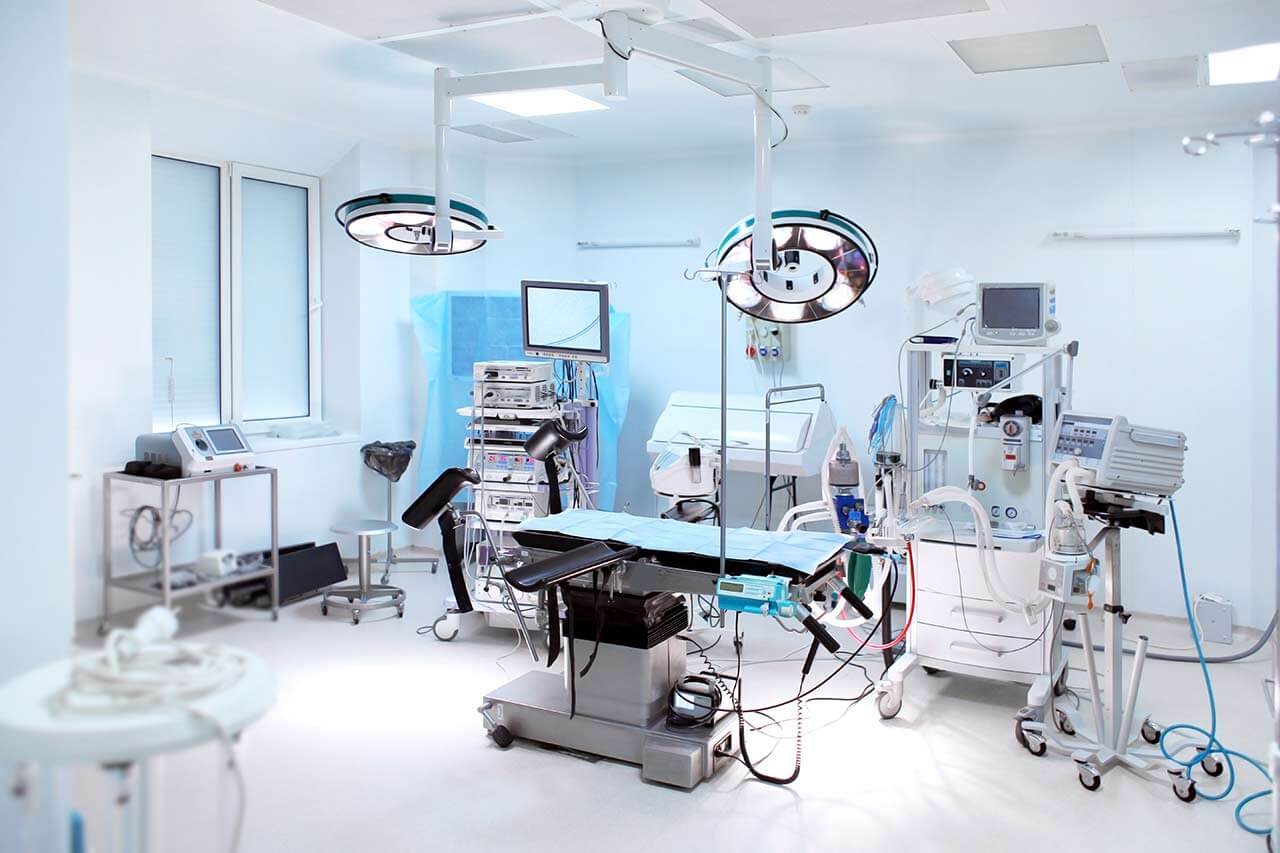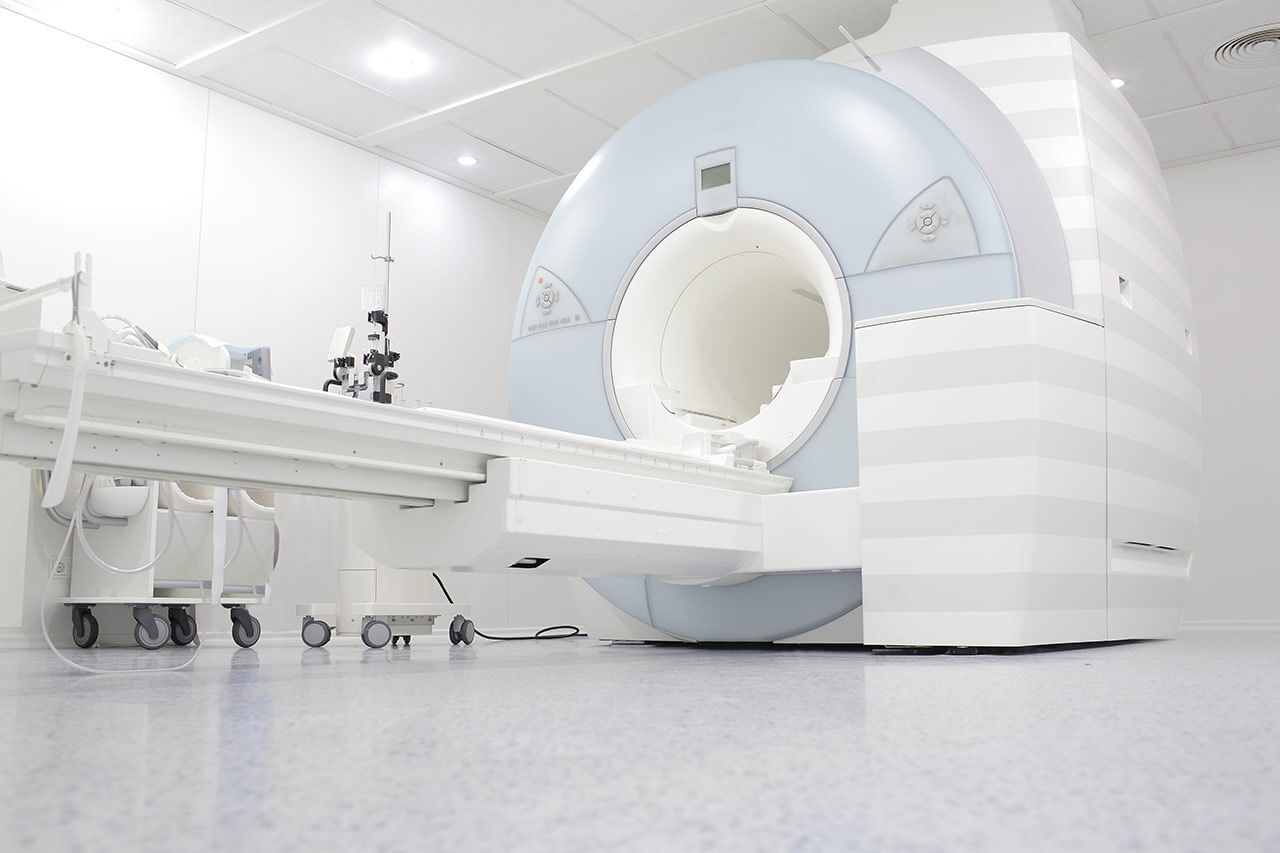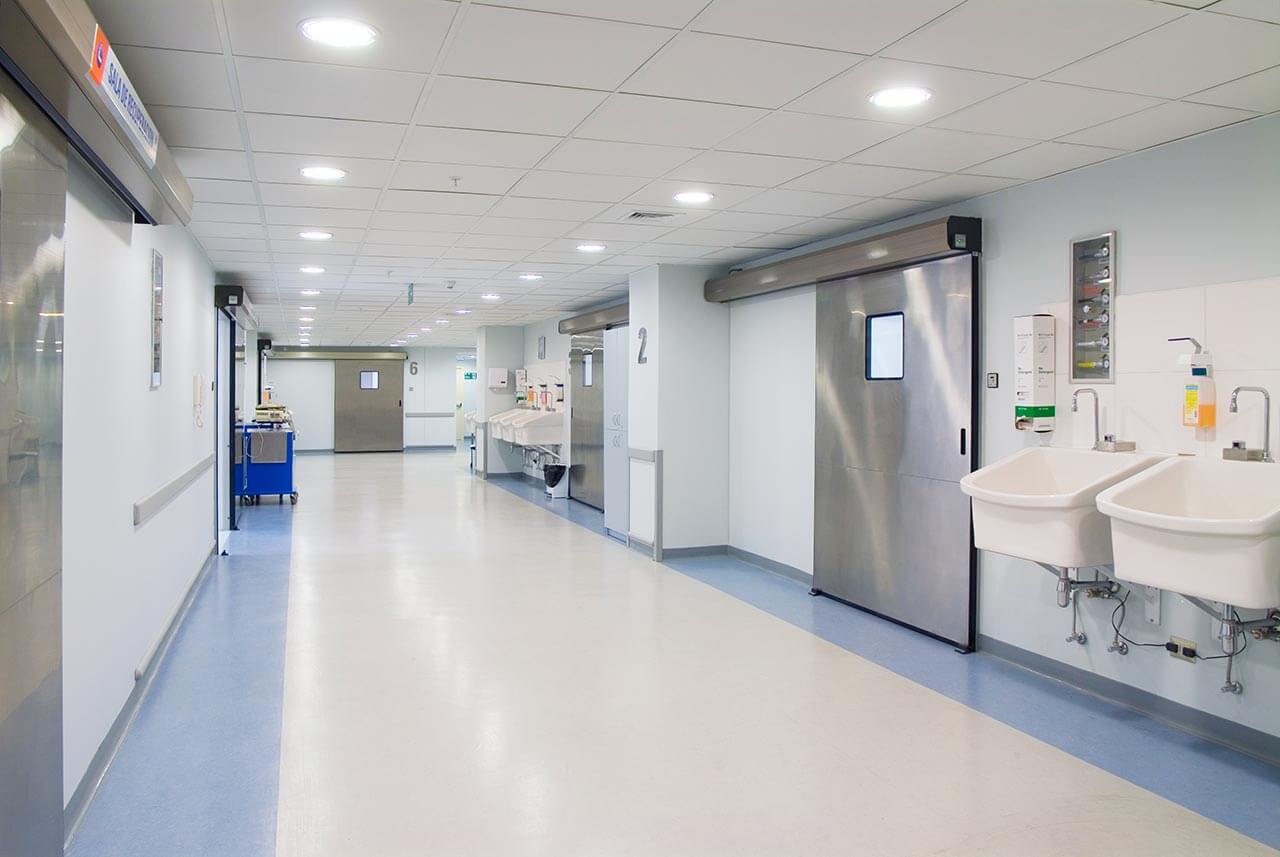
The program includes:
- Initial presentation in the clinic
- clinical history taking
- review of medical records
- physical examination
- laboratory tests:
- complete blood count
- general urine analysis
- biochemical analysis of blood
- inflammation indicators (CRP, ESR)
- indicators blood coagulation
- neurological examination
- functionality x-ray of the spine
- CT/MRI scan of the spine
- neuropsychological tests (on indications):
- ENMG (electroneuromyography)
- SEPs (somatosensory evoked potentials)
- preoperative care
- endoscopic nucleotomy
- postoperative control
- symptomatic treatment
- control examinations
- the cost of essential medicines and materials
- nursing services
- full hospital accommodation
- developing of further guidance
Required documents
- Medical records
- X-ray of the cervical spine (if available)
- MRI/CT scan of the cervical spine (if available)
Service
You may also book:
 BookingHealth Price from:
BookingHealth Price from:
About the department
The Department of Orthopedics, Trauma Surgery and Foot Surgery at the University Hospital Halle (Saale) provides a full range of modern diagnostics and conservative and surgical treatment of musculoskeletal diseases. The primary clinical interest of the department's team of doctors is the medical care of patients with diseases of large joints, spine, and foot, bone and soft tissue sarcomas, injuries of any severity, including multiple and geriatric. The department includes a specialized Maximum Care Joint Replacement Center (EndoCert and ClarCert certified), which successfully performs partial and total knee and hip arthroplasty. It should be noted that these operations are performed through a minimally invasive approach, which allows for postoperative restoration of mobility in the shortest possible time. The department also has a well-developed area of arthroscopic surgery of the knee, hip, and shoulder joints and offers modern methods of treatment of foot and ankle pathologies. The high quality of medical care is confirmed by numerous prestigious certificates, such as the certificate of the German Spine Society (DWG), the certificate of the German Foot and Ankle Society (DAF), the certificate of the German Society for Orthopedics and Trauma Surgery (DGOU), the certificate of the German Cancer Society (DKG), the certificate of the German Knee Society (DKG), the certificate of the German Trauma Society (DGU), and others. The Head Physician of the department is Prof. Dr. med. Karl-Stefan Delank.
The department includes an advanced Maximum Care Joint Replacement Center with EndoCert and ClarCert certification. The center's specialists perform hip replacement surgery for patients with arthrosis, rheumatoid arthritis, femoral head aseptic necrosis, femoral neck fractures, and femoral neck pseudoarthrosis. They also perform knee replacement surgery for arthrosis, intra-articular fractures, lesions associated with systemic diseases (gout, psoriasis, or rheumatism), and other pathologies. The decision to perform arthroplasty is made in cases of severe joint dysfunction and reduction of the patient's quality of life due to severe pain, when conservative therapy does not give the desired result. At the stage of preparation for hip or knee replacement surgery, the surgeon selects the optimal type of prosthesis taking into account the diagnosis, the condition of the bone tissue, the patient's body weight, the presence of concomitant pathologies, and other factors. The orthopedists of the department work only with high-quality endoprostheses of the world's leading manufacturers, which have a service life of at least 15-20 years. A great advantage for the patients of the department is that all hip and knee joint replacement surgeries are performed here using minimally invasive surgical techniques, which ensures minimal trauma to soft tissues and preserves the integrity of the musculoskeletal system. As a result, the postoperative pain syndrome is relieved, patients are able to get back on their feet very quickly, and the rehabilitation period is significantly shortened.
A major clinical focus of the department is the treatment of benign and malignant bone and soft tissue tumors and bone metastases, such as those arising from colorectal cancer, lung cancer, or breast cancer. When a bone or soft tissue sarcoma is suspected, a comprehensive diagnosis is performed, including imaging tests (X-ray, CT, and MRI), laboratory tests, and a biopsy with histologic examination of the biological material obtained. Based on the results of the preliminary diagnosis, the most effective treatment regimen for the patient is planned by the interdisciplinary tumor board, which includes orthopedists, oncologists, radiation therapists, radiologists, and other specialists. The first-line treatment is usually surgical resection of the malignancy. In some cases, neoadjuvant chemotherapy is given before surgery to shrink the tumor, which makes it possible to reduce the scope of the surgical procedure. Chemotherapy is also often given after surgery to destroy any remaining cancer cells and prevent cancer recurrence. In many cases, radiation therapy is also included in the treatment regimen.
The department's team of orthopedists also specializes in the diagnosis and treatment of spinal diseases. Neurosurgeons are often involved in the therapeutic process, which allows determining the optimal treatment tactics for the patient, taking into account the slightest nuances of a specific spinal pathology. The department's specialists successfully operate on patients with cervical, thoracic, and lumbar disc herniation, spinal stenosis, spinal instability, spondylodiscitis, scoliosis, kyphosis, spinal tumors and metastases, spinal injuries, including osteoporotic fractures, and spinal lesions due to rheumatism. Spinal surgery is performed using low-traumatic minimally invasive and microsurgical techniques.
The department is justifiably proud of its excellence in foot and ankle surgery. The medical facility is certified according to the strict requirements of the German Foot and Ankle Society (DAF). Specialists in this field perform conservative and surgical treatment of ankle arthrosis, diabetic foot syndrome, flat feet, hollow feet, Achilles tendon ruptures, ligament ruptures, ankle osteochondritis dissecans, and foot deformities. Whenever possible, conservative treatment is performed using special orthopedic devices, physiotherapy procedures, cryotherapy, heat therapy, drug therapy, laser therapy, and other methods. When conservative measures fail, doctors consider the possibility of surgery. Foot and ankle surgery is performed in the department using minimally invasive techniques.
The primary clinical activities of the department's medical team include the following:
- Orthopedics
- Joint replacement surgery
- Partial and total hip replacement surgery
- Partial and total knee replacement surgery
- Partial and total shoulder replacement surgery
- Orthopedic oncology
- Surgery for benign bone and soft tissue tumors
- Surgery for malignant bone and soft tissue tumors
- Surgery for bone metastases
- Spinal surgery
- Surgery for spinal disc herniation
- Surgery for spinal instability
- Surgery for spinal stenosis
- Surgery for spondylodiscitis
- Surgery for scoliosis and kyphosis
- Surgery for spinal tumors and metastases
- Surgery for spinal injuries, including osteoporotic fractures
- Surgery for spinal lesions due to rheumatism
- Pelvic surgery
- Surgery for anterior and posterior pelvic fractures
- Surgery for pubis symphysis (divergence of the pelvic bones)
- Surgery for sacroiliac joint injuries
- Surgery for acetabular fractures
- Surgery for sacral fractures
- Surgery for osteoporotic pelvic fractures
- Arthroscopic surgery
- Arthroscopic surgery for hip diseases
- Arthroscopic surgery for knee diseases
- Arthroscopic surgery for shoulder diseases
- Orthopedic rheumatology
- Conservative and surgical treatment of rheumatoid arthritis
- Conservative and surgical treatment of psoriatic arthritis
- Conservative and surgical treatment of Bechterew's disease
- Conservative and surgical treatment of reactive arthritis
- Conservative and surgical treatment of gout
- Conservative and surgical treatment of osteoporosis
- Conservative and surgical treatment of Paget's disease
- Conservative and surgical treatment of collagenosis
- Conservative and surgical treatment of osteogenesis imperfecta
- Joint replacement surgery
- Trauma surgery
- Conservative and surgical treatment of proximal and distal humerus fractures
- Conservative and surgical treatment of forearm fractures
- Conservative and surgical treatment of vertebral fractures, including osteoporotic ones
- Conservative and surgical treatment of femoral and femoral neck fractures
- Conservative and surgical treatment of tibia fractures
- Conservative and surgical treatment of pelvic bone fractures
- Conservative and surgical treatment of fractures and damage to endoprostheses and osteosynthesis devices
- Foot surgery
- Conservative and surgical treatment of ankle arthrosis
- Conservative and surgical treatment of diabetic foot syndrome
- Conservative and surgical treatment of flat feet
- Conservative and surgical treatment of hollow feet
- Conservative and surgical treatment of Achilles tendon ruptures
- Conservative and surgical treatment of ligament ruptures of the foot
- Conservative and surgical treatment of ankle osteochondritis dissecans
- Conservative and surgical treatment of foot deformities
- Other medical services
Curriculum vitae
Higher Education and Postgraduate Training
- 1988 - 1990 Medical studies, Justus Liebig University Giessen.
- 1990 - 1994 Medical studies, Technical University of Munich.
- 1995 Thesis defense, Faculty of Medicine, Technical University of Munich. Subject: "Surgical treatment of thoracic vertebral fractures. Comparison of dorsal stabilization and dorsoventral fusion."
- 2007 Habilitation, Faculty of Medicine, University of Cologne. Subject: "Functional changes in lumbar spine segments during decompression and stabilization for lumbar spinal stenosis."
Professional Career
- 1995 - 1996 Internship, Marienhospital Herne, Faculty of Medicine, Ruhr University Bochum.
- 1996 - 1998 Residency, Department of Surgery, University Hospital Bergmannsheil, Bochum.
- 1998 - 2001 Physician, Department of Orthopaedics, University Hospital Mainz.
- 2002 - 2011 Senior Physician and Managing Senior Physician (since 01.06.2006), Department of Orthopaedics and Trauma Surgery, University Hospital Cologne.
- Since 01.03.2011 Head Physician, Department of Orthopedics, Trauma Surgery and Foot Surgery, University Hospital Halle (Saale).
Board Certification and Additional Qualifications
- Board certification in Orthopedics and Trauma Surgery.
- Specialization in Rheumatology.
- Additional qualification in Special Orthopedic Surgery.
- Additional qualification in Special Trauma Surgery.
- Additional qualification in Critical Care Medicine.
- Additional specialization in Chiropractic.
- Theoretical foundations in Radiation Protection.
Clinical Interests
- Conservative and surgical treatment of spinal diseases.
- Conservative and surgical treatment of musculoskeletal tumors.
- Conservative and surgical treatment of rheumatic diseases.
Memberships in Professional Societies and Organizations
- German Society for Orthopaedics and Orthopaedic Surgery (DGOOC).
- German Spine Society (DWG).
- European Spine Society (ESS).
- Board Member of the Rheumatology Center Halle (Saale).
- Co-Founder of the "Working Section Evidence-Based Medicine AK 19" of the German Society for Orthopaedics and Orthopaedic Surgery (DGOOC).
- Co-Founder and Board Member of the Center for Integrated Oncology at the University Hospital Cologne.
- Full Member of the German-speaking National Committee for the TNM Classification of Tumors of the German Cancer Society (DKG).
Photo of the doctor: (c) Universitätsklinikum Halle (Saale)
About hospital
According to the prestigious Focus magazine, the University Hospital Halle (Saale) is one of the best medical institutions in Germany!
The history of the hospital goes back more than 300 years, and during this time it has managed to gain an excellent reputation not only in Germany, but also throughout the world. The hospital positions itself as a specialized healthcare facility for the treatment of severe and rare diseases and injuries. The hospital provides medical care to patients of all ages in compliance with the latest scientific achievements. The hospital is distinguished by successful research activities, especially in the field of cardiovascular diseases and oncopathologies – the specialists in these areas have made significant contributions to the development of the very latest diagnostic methods and therapeutic approaches.
The University Hospital Halle (Saale) has 30 specialized departments representing almost all areas of modern medicine, as well as 17 narrowly focused institutes. About 35,000 patients receive qualified medical care of European standards in the hospital every year, and more than 212,000 patients are served on an outpatient basis. This number of patients is evidence of the high efficiency of medical services and the excellent image of the hospital in the international medical arena; patients from all over the world regularly seek medical attention here.
Some of the hospital's structural units deserve special attention. For example, the Central Emergency Department (the largest in Saxony-Anhalt), modern dental clinics, the Perinatal Center, and the Transplant Center, which has a history of more than 40 years. The Transplant Center performs more than 40 kidney transplants annually, most of them from living donors.
Thanks to the use of the latest medical technologies and the availability of state-of-the-art equipment, many previously high-risk surgeries and procedures can now be performed in the hospital using sparing techniques. In this context, hybrid cardiac surgery and robotic surgery using the innovative da Vinci Si® system in urology are worthy of mention.
An integral part of the successful clinical practice of the University Hospital Halle (Saale) is the availability of experienced and competent medical staff. The total number of employees at the hospital is more than 4,450. Many physicians are known far beyond the borders of Germany: they regularly conduct important research that enables the development of modern medicine. In addition, the hospital specializes in training medical students, so qualified doctors and professors are willing to pass on their experience to the younger generation.
The hospital has many quality certificates such as DIN EN ISO 9001:2015 certificate, German Cancer Society (DKG) certificate, JACIE certificate, EndoCert certificate, ClarCert certificate, German Spine Society (DWG) certificate, German Trauma Society (DGU) certificate, CERT iQ certificate, LGA InterCetert certificate, and others.
Photo: (с) depositphotos
Accommodation in hospital
Patients rooms
The patients of the University Hospital Halle (Saale) stay in comfortable single, double, and triple rooms with a modern design. All patient rooms have an ensuite bathroom with a toilet and a shower. The standard patient room includes a comfortable automatically adjustable bed, a bedside table, a wardrobe, a table and chairs for receiving visitors, a TV, a radio, and a telephone. The patient rooms have access to Wi-Fi. For safety reasons, the use of laptops and cell phones is prohibited in some areas, including the intensive care units. The hospital also offers enhanced-comfort patient rooms.
Meals and Menus
The hospital offers delicious and well-balanced meals three times a day: breakfast, lunch, and dinner. Patients and their companions can choose from three daily menus, which always include dietary dishes. If necessary, an individual menu can be prepared for the patient. Children are offered a special menu with healthy and tasty dishes, rich in nutrients necessary for a growing body.
Further details
Standard rooms include:
![]() Toilet
Toilet
![]() Shower
Shower
![]() Wi-Fi
Wi-Fi
![]() TV
TV
Religion
Religious services are available upon request.
Accompanying person
Your accompanying person may stay with you in your patient room or at the hotel of your choice during the inpatient program.
Hotel
Your accompanying person may stay with you in your patient room or at the hotel of your choice during the inpatient program.




